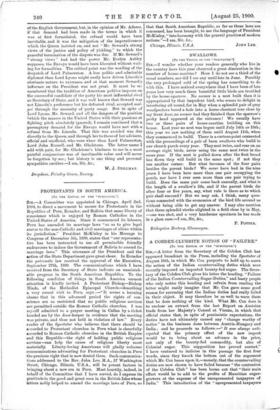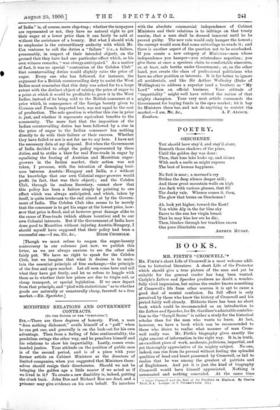A COBDEN-CLUBBITE NOTION OF " FAILURE."
[To THE EDITOR OF THE "SPECTATOR."] Sra,—A letter from the Secretary of the Cobden Club has appeared broadcast in the Press, including the Spectator of August 18th, in which Mr. Cox purports to hold up to scorn the action of the Indian countervailing duties which were recently imposed on imported bounty-fed sugar. The Secre- tary of the Cobden Club gives his letter the heading, "Failure of the Indian Countervailing Sugar-Duties," and hasty people who only notice this heading and refrain from reading the letter might easily imagine that Mr. Cox gave some good reason for assuming that the Indian duties had really failed in their object. It may therefore be as well to warn them that he does nothing of the kind. What Mr. Cox does is to enclose an extract from the last Report on Austrian trade from her Majesty's Consul at Vienna, in which that official states that, in spite of pessimistic expectations, the duties have not ultimately caused any " change worthy of notice " in the business done between Austria-Hungary and India ; and he proceeds as follows :—" It was always anti- cipated that the primary effect of the new impost would be to bring about an advance in the price, not only of the bounty-fed commodity, but also of Colonial sugar. This supposition has proved correct." I have ventured to italicise in this passage the first four words, since they knock the bottom out of the argument which Mr. Cox bases upon it,—namely, that the countervailing duties are now shown to have failed because " the contention of the Cobden Club" has been borne out that "their main effect would be to add to the profits of Mauritian sugar- growers at the expense of the unrepresented taxpayers of India." This introduction of the " unrepresented taxpayers of India " is, of course, mere clap-trap ; whether the taxpayers are represented or not, they have no natural right to get their sugar at a lower price than it can fairly be sold at without the assistance of a bounty. But what I should wish to emphasise is the extratardinary audacity with which Mr. Cox ventures to call the duties a "failure " (i e., a failure, presumably, in respect of their intended object), on the ground that they have had one particular effect which, as his own witness remarks, " was alway.s anticipated." As a matter of fact, it was no special " contention of the Cobden Club " that countervailing duties would slightly raise the price of sugar. Every one who has followed, for instance, the argument for a British countervailing duty to assist the West Indies must remember that this duty was asked for to a large extent with the distinct object of raising the price of sugar to a point at which it would be profitable to grow it in the West Indies, instead of its being sold to the British consumer at a price which, in consequence of the foreign bounty given to German and French imported beet, was not equal to the cost of production. The sole question is whether this rise in price is just, and whether it represents equivalent benefits to the community. The mere fact that the imposition of the Indian countervailing duties has been followed by a rise in the price of sugar to the Indian consumer has nothing directly to do with their failure or their success. Whether they have failed or not is not for me to say here. I have not the necessary data at my disposal. But when the Government of India decided to adopt the policy represented by these duties, and to strike a blow for real Free-trade in sugar by equalising the footing of Austrian and Mauritian sugar- growers in the Indian market, their action was not taken, I presume, with the intention of damaging busi- ness between Austria - Hungary and India., n r without the knowledge that our own Colonial sugar-growers would profit (in fact, that was their object) ; and the Cobden Club, through its zealous Secretary, cannot show that this policy has been a failure simply by pointing to one effect which was always anticipated, and which, taken by itself, is quite irrelevant to the end aimed at by the Govern- ment of India. The Cobden Club idea seems to be merely that the consumer is to get his sugar at the lowest price, how- ever that price is fixed, and at however great damage alike to the cause of Free-trade (which abhors bounties) and to our own Colonial interests. But if the Government of India have done good to Mauritius without injuring Austria-Hungary, I should myself have supposed that their policy had been a
successful one.—I am, Sir, &c., HUGH CHISHOLM.
[Though we must refuse to reopen the sugar-bounty controversy in our columns just now, we publish this letter, as we are always anxious to see the other side fairly put. We have no right to speak for the Cobden Club, but we imagine that what it desires is to main- tain the essential principle of free exchange,—the principle of the free and open market. Let all men come here and sell what they have got freely, and let us refuse to haggle with them as to whether their low prices are due to virgin soil, or cheap transport, or special legislation. If we once depart from that principle, and plod with statisticians " as to whether goods are naturally or unnaturally cheap, farewell to a free market.—En. Spectator.]



































 Previous page
Previous page